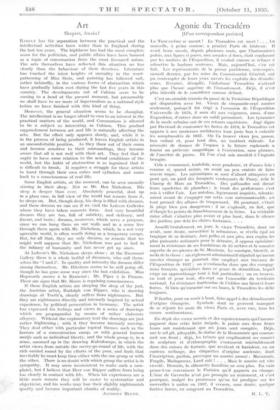Art
Sleepers, Awake!
RARELY has the separation between the practical and the intellectual activities been wider than in England, during the last ten years. The highbrow has had the most complete scorn for the politician, and public affairs have been banned as a topic of conversation from the most favoured salons. The arts themselves have reflected this situation no less dearly than the behaviour of their devotees. Literature has touched the iciest heights of unreality in the word- patterning of Miss Stein, and painting has followed suit, rather belatedly, in the various forms of abstraction which have gradually taken root during the last five years in this country. • The developments Out of Cubism seem to be coming to a head at the present moment, but presumably we shall have to see more of Superrealism as a national style before we have finished with this kind of thing.
However, the general situation seems to be changing. The intellectual is no longer afraid to own to an interest in the practical matters of the world, and Communism is allowed te be a subject as interesting as Cubism. This gradual rapprochement between art and life is naturally affecting the arts. But the effect only appears slowly, and, while it is in the process of being produced, it leaves English artists in an uncomfortable position. As they thaw out of their coma and become sensitive to their surroundings, they become aware that all is not well with their art.. They feel that it ought to have sonic relation to the actual conditions of the world, but the habit of abstraction is so ingrained that it is difficult to break. It requires a struggle for these artists to burst through their own cubes and cylinders and come back to a consciousness of real life.
Some English artists, at the moment, can be seen uneasily stirring in their sleep. Not so Mr. Ben Nicholson. His sleep is deeper than ever. Absolutely peaceful, shut up in a glass case; in full view of the world but 'remote from it, he sleeps on. But, though deep, his sleep is filled with dreams, and these dreams we can see if we visit the Lefevre Galleries where they have taken concrete form. And very beautiful dreams they are too, full of subtlety, and delicacy, and finesse, and taste; dreams, moreover, which serve a purpose, since we can hang them on our walls and in a sense live through them again with Mr. Nicholson, which, in a not very agreeable world, is often worth doing as a temporary escape. But, for all that, they are only dreams, so remote that we might well suppose that Mr. Nicholson was put to bed in the infancy of humanity and has never got up since.
At Lefevre's Mr. Nicholson sleeps alone ; at the Zwemmer Gallery there is a whole bedful of dreamers, who call them- selves the ' 7 and 5'. in quality and intensity the dreams differ among themselves. Mr. Hitchens seems to be still going off, though he has gone sonic way since the last exhibition. Miss Hepworth snores a la Braneusi ; Mr. Piper a la Picasso. There are signs that Mr. Moore is regaining consciousness.
If these English artists are sleeping the sleep of the just, the Austrian artist, Rudolph von Ripper, who is showing drawings at Tooth's, clearly suffers from nightmares. But they are nightmares directly and intensely inspired by actual experience, by political persecution in Germany. The artist has expressed his feelings and views in a series of drawings which are propagandist by means of rather elaborate allegory. Without the explanatory text the drawings are just rather frightening ; with it they become intensely moving. They deal either with particular topical themes such as the horrors of a concentration camp, or with general huriaan motifs such as individual liberty, and the whole group is, in a sense, summed up in the drawing Kaleidoscope, in which the artist views from outside the merry-go-round of life, with the rich carried round by the efforts of the poor, and finds that inevitably he must keep time either with the one group or with the other. There is no doubt with which group the artist is in sympathy. It may seem inconsistent to make such a com- plaint., but I believe that Herr von Ripper suffers from being too closely in contact with life. When his experiences are a little more remote they will be easier to systematise and objectivise, and his works may lose their slightly nightmarish quality and become important chunks of reality.
ANTHONY BLUNT.






























































 Previous page
Previous page